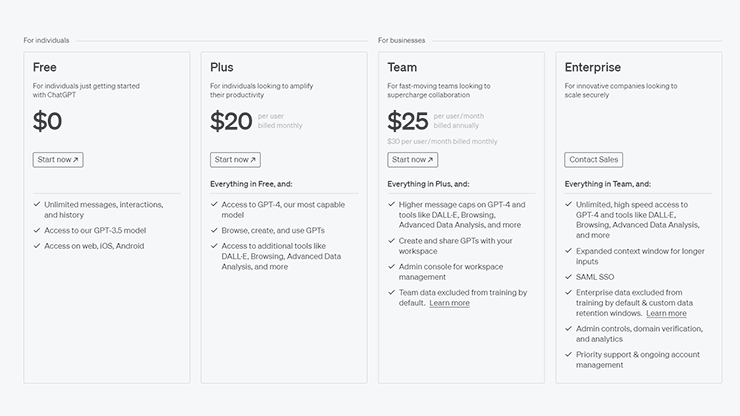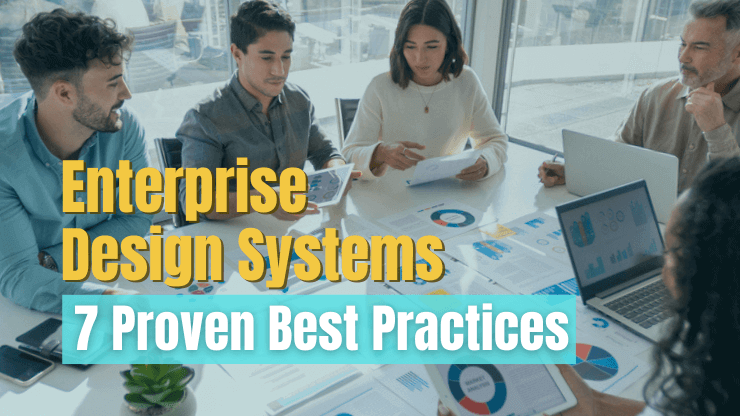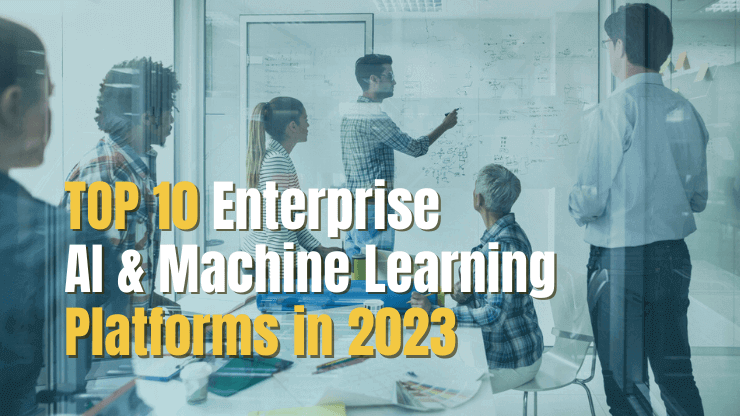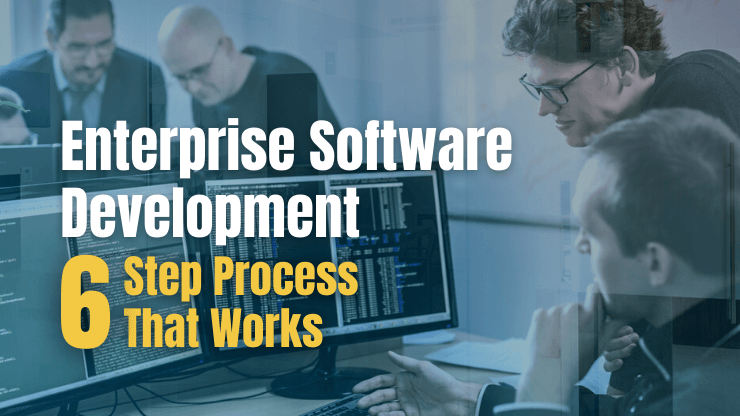While OpenAI’s ChatGPT captivated over 100 million users within its first week, its journey into the enterprise sector has been more measured. Enterprises, traditionally cautious, are weighing the innovative potential of generative AI against inherent risks like data security and compliance challenges.
Yet, with forecasts predicting enterprise spending on generative AI services to soar to $143 billion by 2027, technology leaders like OpenAI are innovating with tailored solutions. ChatGPT Enterprise emerges as a response, designed to bridge the gap between cutting-edge AI capabilities and enterprise-grade requirements. In this 2024 guide to ChatGPT Enterprise, we delve into its core offerings, dissecting the benefits, addressing the risks, and demystifying the transformative impact it could have across industries.
What is ChatGPT Enterprise?
ChatGPT Enterprise is an enterprise-grade version of ChatGPT. It is designed to meet the needs of large businesses and organizations, offering features that are particularly valuable in an enterprise setting.
The launch of ChatGPT Enterprise in August 2023 marked the beginning of a trend for AI technology companies tailoring their solutions to the specific needs and security concerns of enterprises.
Key benefits of ChatGPT enterprise
ChatGPT Enterprise, tailored specifically for corporate use, represents a significant advancement in how businesses can harness AI. In this section we’ll highlight the range of advanced data analysis capabilities aligned with the unique demands of the corporate sector.
Enhanced security
According to recent research, sensitive data makes up 11% of what employees put into ChatGPT. That could include things like company financial data, PII and PHI. Clearly, enterprises are concerned about the data their employees are putting into ChatGPT, and ChatGPT Enterprise addresses this critical concern with a security framework designed to protect both customer interactions and company data, including:
- Exclusive data usage practices: Unlike previous versions of ChatGPT, ChatGPT Enterprise ensures that customer prompts and company data entered into ChatGPT chats are not utilized to train OpenAI's models.
- Data encryption standards: ChatGPT Enterprise implements encryption of data at rest and in transit, ensuring that all information is protected through industry-standard encryption methodologies. Such encryption is vital in preventing data breaches and maintaining the integrity of corporate information.
- Compliance with SOC 2 certification: ChatGPT Enterprise is SOC 2 certified, which means it adheres to high standards of security, availability, processing integrity, confidentiality, and privacy as established by the American Institute of Certified Public Accountants (AICPA)
Enterprise management tools
ChatGPT Enterprise provides a suite of management tools that provide enterprises a level of oversight and management that they expect with enterprise software solutions, including:
- Single sign-On (SSO) support: Enables employees to access ChatGPT with their existing work login credentials, streamlining the login process and enhancing security.
- Domain verification: Assures that employees are using the company-provisioned AI model, maintaining integrity and preventing unauthorized access.
- Admin console with bulk member management: A comprehensive admin console allows for efficient management of user groups, simplifying onboarding and access control for large teams.
- Analytics for usage tracking: Provides valuable usage insights into how employees use ChatGPT, aiding in optimization, compliance monitoring, and strategic planning.
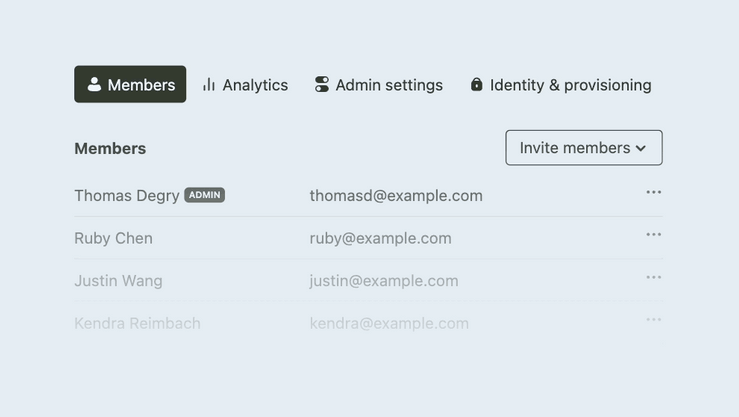
No usage caps
ChatGPT Enterprise offers unlimited usage of GPT-4V, the multimodal LLM that accepts both text and image prompts. This means enterprises don’t have to worry about their employees hitting usage limits, and it means they are equipping employees with an AI tool that has a broader range of applications like:
- Creative brainstorming for developing innovative advertising campaigns and providing product design inspiration with conceptual sketches and ideas.
- Enhanced visual content generation for creating compelling social media graphics and illustrative educational materials in various formats
- Visual data interpretation for understanding and analyzing complex data visualizations, such as business analytics dashboards, scientific data charts, and statistical graphs, to provide insights and actionable recommendations.
For example, with access to GPT-4V, employees can use ChatGPT Enterprise to interpret data like this:
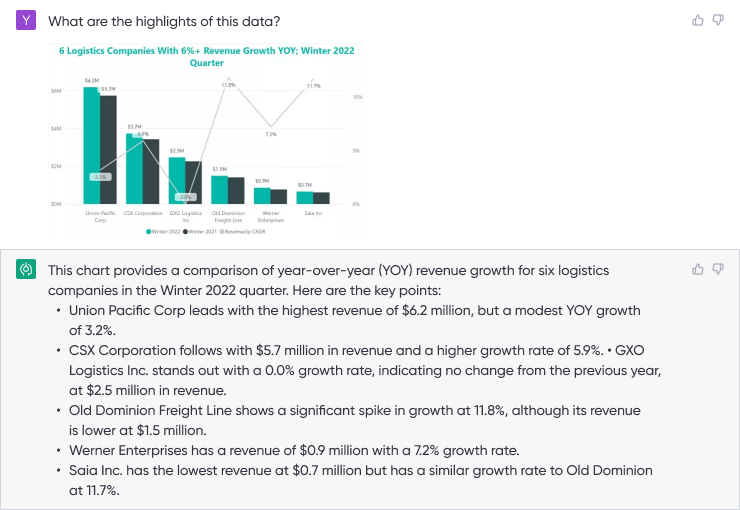
Accepts longer prompts
ChatGPT Enterprise's 128K token context window significantly enhances its capability for processing longer inputs. This expanded input and memory capacity allows users to rapidly explore answers to more detailed inquiries and complex requests in a single interaction, greatly benefiting scenarios that require extensive information or context.
For example, in legal contexts, this feature allows for the comprehensive review of lengthy contracts or legal documents, ensuring that all pertinent details are considered. In engineering, it facilitates detailed project planning by encompassing entire specifications and requirements in one analysis. Additionally, in the software development sector, this expanded capacity can significantly accelerate coding tasks. Developers can feed in extensive code snippets or intricate problem statements, and receive precise, context-informed guidance.
Unlimited access to advanced data analysis (ADA)
ChatGPT Enterprise offers unlimited access to advanced data analysis capabilities, an evolution of the existing Advanced Data Analysis model (formerly known as Code Interpreter) to improve performance on text-rich documents like PDFs, word documents, and presentations. Specifically, ADA provides:
- Synthesis - Analyzing and combining information from various documents to create new content or uncover fresh insights.
- Transformation - Modifying how information is presented while retaining its fundamental meaning and content
- Extraction - Selecting and retrieving particular elements of information from a document.
Shareable chat templates
ChatGPT Enterprise's latest feature, shared chat templates, represents a significant step forward in democratizing access to AI technology within the workplace. This functionality allows team members to create and distribute custom ChatGPT prompts tailored to specific workflows or business needs.
These templates serve as a bridge, enabling employees with varying levels of AI familiarity to engage with and leverage ChatGPT’s capabilities more effectively.
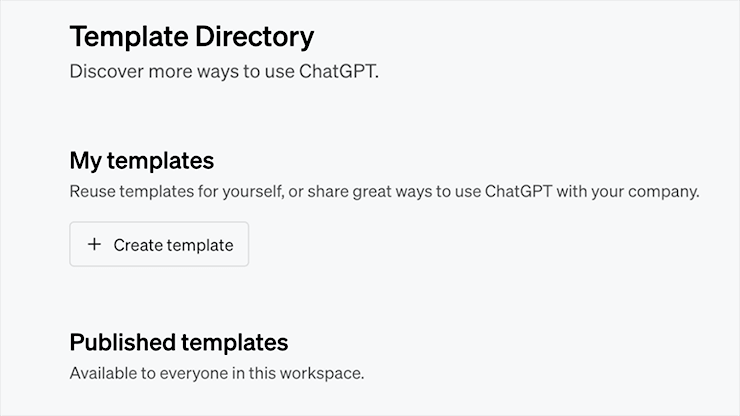
Marketplace of GPTs
The GPT store is a marketplace of over 3 million GPTs built by anyone to create a tailored version of ChatGPT. As of January 2024, OpenAI had rolled out the GPT Store to ChatGPT Team plan members and is in the process of rolling out access to ChatGPT Enterprise members over the next few weeks.
A few things of note:
- As of January 2024, access for ChatGPT Enterprise users was still being rolled out.
- ChatGPT Enterprise provides admins with control over how internal-only GPTs are shared and which external GPTs may be used inside the business
- No conversations with GPTs are used to improve or train the OpenAI models
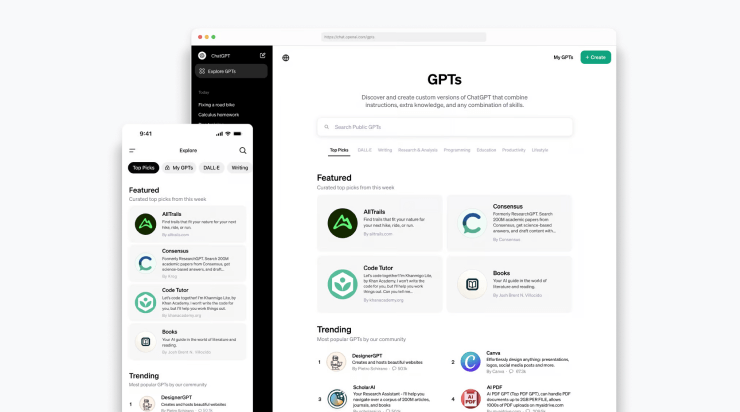
Top risks of ChatGPT enterprise
While ChatGPT Enterprise offers enhanced security over traditional ChatGPT, it's important for enterprises to be aware of certain risks and limitations that prevail:
Can’t permanently extend knowledge base with company data
One of the key expectations many enterprises have is the ability of the AI to access, learn from, and utilize company-specific data. This business data could range from internal policies and procedures to customer databases, market data, technical manuals, and more. The intention is often to create a sophisticated Q&A system or decision-support tool that is tailored to the company's unique environment.
However, a significant limitation of ChatGPT Enterprise, as it currently stands, is its inability to permanently augment its knowledge base with company-specific data. While businesses can upload their data to ChatGPT Enterprise, the retention of this data is temporary. According to the current policy, "Files are retained while the conversation is active and for three hours after the conversation is paused, after which they are deleted.”
This temporary nature of data storage ensures that sensitive company information is not used for training OpenAI models, addressing privacy and security concerns. However, it also means that any learning or customization based on company data is essentially reset after each session, preventing the development of a deeply integrated and personalized AI tool.
File uploads are limited
While ChatGPT’s Advanced Data Analysis offers improved performance on text-rich documents like PDFs, word documents, and presentations, there are some noteworthy limitations on the files you can upload:
- Within the regular ChatGPT Enterprise chat experience, users can only upload one file at a time.
- When using Advanced Data Analysis, users can upload 10 files at a time and 20 files total
- File size is limited to 500 MB each
These limitations present a notable challenge for businesses seeking comprehensive data analysis and document interaction capabilities. In practical terms, this means businesses must be highly selective about the documents they upload, potentially omitting valuable information due to the cap. For large-scale projects or in-depth research, this limitation could influence a business's choice of another AI tool.
Network isolation is not possible
While enterprise grade security has been improved over traditional ChatGPT, enterprises may still have concerns over data security. One of the primary concerns with ChatGPT Enterprise is the absence of network isolation. This means that the data and interactions are not confined within a private network, which could be a significant concern for businesses handling highly sensitive information.
No clear pricing structure
For companies who want to get employees equipped with ChatGPT quickly, ChatGPT Enterprise may have drawbacks. Because pricing is custom and “varies depending on the needs of each company,” according to OpenAI, enterprises must reach out to OpenAI’s sales team for pricing and the larger the enterprise, the faster, and easier it will be to get going quickly.
While pricing is not public, what we do know is:
- Individuals can still get access to ChatGPT Plus for $20/mo
- Teams of any size can access an “Enterprise-lite” business version of ChatGPT at $25/mo per user
- Some users have reported that they reached out to sales and were quoted $60 per user per month for ChatGPT Enterprise, with a minimum of 150 seats and a 12-month contract.
Speeds are still not competitive
While OpenAI boasts "up to 2x faster processing", it’s still not on par with GPT-4, Turbo, or competitors like Anthropic, Google, and Perplexity. The reality is that ChatGPT Enterprise runs on a pool of shared servers, so speeds are not guaranteed. Hardware load at a given time is more likely to have an impact on speeds.
It’s also important to know that there is no clear answer if Azure OpenAI is actually faster than ChatGPT Enterprise. Early findings indicate that “for 90% of the runs, Azure OpenAI is slightly faster than OpenAI, but 10% of Azure OpenAI’s runs take very long.” Others report that if performance is a consideration, then Azure is the better service to use.
Risk of misinformation & hallucinations
ChatGPT Enterprise, similar to other Large Language Models (LLMs), faces the inherent challenge of potentially generating misinformation or 'hallucinations'. A key limitation in this context is the model's inability to provide source citations for its generated content. This poses a significant risk for enterprises, particularly in scenarios where accuracy is paramount, as the use of unverified information could lead to legal liabilities or erroneous decision-making.
Moreover, the 'black-box' nature of OpenAI’s model training process compounds these risks, as enterprises cannot fully assess or mitigate potential inaccuracies arising from the AI's internal mechanisms.
PRO TIP: Retrieval-augmented generation (RAG) provides enterprises a way to achieve higher levels of AI trust by sourcing responses not just from the LLM, but through an external knowledge base of curated, company-specific data.
What’s next for AI in the enterprise environment?
A report from AI Infrastructure reveals a strong sense of optimism among enterprises, with 81% of survey respondents anticipating AI to elevate their industry’s efficiency by at least 25% in the next two years. And enterprise investment is in alignment with this. By 2025, Global 2000 organizations are expected to dedicate over 40% of their core IT budgets to AI-driven initiatives.
The prevailing enterprise AI trends indicate enterprises’ focus on:
- Doubling down on AI investments
- Maturing their deployment of AI for long-term scalability
- Equipping their workforce with the necessary skills to embrace AI long-term.
If you’re looking for a partner to help you implement the next phase of your enterprise AI transformation. Our team will partner with you to build a comprehensive AI strategy. We'll assist you in selecting the most suitable AI technologies, seamlessly integrating them into your existing tech stack, and delivering a user-ready AI product.
Conclusion
OpenAI launching ChatGPT Enterprise represents a significant leap forward in integrating artificial intelligence within the corporate sector. By providing enhanced security, unlimited advanced data analysis, and extensive customization options, ChatGPT Enterprise is positioned to transform how businesses interact with AI technology.
As many enterprises continue to evolve in an increasingly digital landscape, tools like ChatGPT Enterprise are set to play a pivotal role in driving corporate efficiency and enabling digital transformation on a grand scale.

![2024 Guide to ChatGPT Enterprise [Benefits, Risks & More]](/.netlify/images?url=_astro%2Fchatgpt-enterprise.DoxG6j2E.png)
